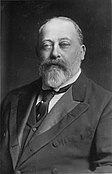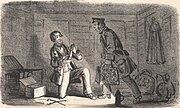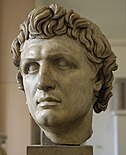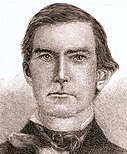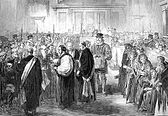Wikipedia:Today's featured article/March 2024
| << | Today's featured articles for March 2024 | >> | ||||
|---|---|---|---|---|---|---|
| Su | Mo | Tu | We | Th | Fr | Sa |
| 1 | 2 | |||||
| 3 | 4 | 5 | 6 | 7 | 8 | 9 |
| 10 | 11 | 12 | 13 | 14 | 15 | 16 |
| 17 | 18 | 19 | 20 | 21 | 22 | 23 |
| 24 | 25 | 26 | 27 | 28 | 29 | 30 |
| 31 | ||||||
March 1
Paradise Airlines Flight 901Awas a passenger flight fromSan Jose Municipal AirporttoTahoe Valley Airportin the United States. On March 1, 1964, theLockheedL-049Constellation(example pictured)serving the flight crashed nearGenoa Peak,on the eastern side ofLake Tahoe,killing all 85 aboard. The cause of the accident was the pilot's decision to attempt to land at Tahoe Valley Airport when the visibility was too low. After aborting the attempt, the crew lost awareness of the plane's location as it flew below theminimum safe altitudein mountainous terrain. The pilot likely tried to fly through a low mountain pass to divert to the airport inReno, Nevada,and crashed into a mountain near the pass. At the time, it was the second-deadliest single-plane crash in United States history. It remains the worst accident involving the LockheedL-049Constellation. TheFederal Aviation Administrationrevoked the airline'soperating certificate,causing them to permanently shut down. (Full article...)
March 2
Edward VII(1841–1910) wasKing of the United Kingdomand theBritish Dominions,andEmperor of India,from 1901 untilhis death.The second child and eldest son ofQueen VictoriaandPrince Albert,Edward was largely excluded from political influence during his mother's reign, coming to personify the leisured, fashionable elite. Despite a reputation as a playboy prince, his tours of North America in 1860 and of India in 1875 proved to be popular successes. Edward inherited the throne uponhis mother's deathin 1901. He broadened the range of people with whom royalty socialised, and fostered good relations between Britain and other European countries, especiallyFrance.Nevertheless, his relationship with German emperorWilhelm IIwas poor. TheEdwardian era,which covered Edward's reign and was named after him, coincided with the start of a new century and heralded major changes in technology and society. He was succeeded by his only surviving son,George V.(Full article...)
March 3

SSKroonlandwas anocean linerforInternational Mercantile Marine(IMM) from herlaunchin 1902 until she was scrapped in 1927. When completed byWilliam Cramp & SonsofPhiladelphia,she was the largest-ever United States steamship.Kroonlandsailed for IMM'sRed Star Linefor 12 years, mostly on the route between New York City andAntwerp,and later sailed for IMM'sAmerican LineandPanama Pacific Line.Kroonlandwas one of ten ships that came to the aid of the burning linerVolturnoin the mid-Atlantic in October 1913. Despite stormy seas,Kroonlandtook aboard 89 survivors. In 1915, she became the largest passenger vessel to that point to pass through thePanama Canal.During and afterWorld War I,the ship served asU.S. Armytransport USATKroonlandthrough April 1918, and as theNavyauxiliary USSKroonland(ID-1541) from April 1918 to October 1919. After being returned to IMM, she continued on various passenger routes until 1926. She was sold and scrapped the following year. (Full article...)
March 4
James G. Blaine(1830–1893) was an American statesman andRepublicanpolitician who representedMainein theU.S. House of Representativesfrom 1863 to 1876, serving asSpeaker of the Housefrom 1869 to 1875, and then in theSenatefrom 1876 to 1881. Born inPennsylvaniaand a newspaper editor before entering politics, he twice served as theU.S. secretary of state,first in 1881 under PresidentJames A. Garfieldand PresidentChester A. Arthur,and then from 1889 to 1892 under PresidentBenjamin Harrison.Blaine unsuccessfully sought the Republican presidential nominationin 1876and1880.He gained the nominationin 1884,but inthe election,he was narrowly defeated byDemocraticnomineeGrover Cleveland.A charismatic speaker in an age that prized oratory, Blaine was a leading Republican of the late 19th century and a champion of the party'smoderate reformist faction,later known as the "Half-Breeds".(This articleis part of afeatured topic:1880 United States presidential election.)
March 5
TheGreat Gold Robberytook place on the night of 15 May 1855, when a shipment of gold to Paris was stolen from theguard's vanof the rail service between London andFolkestone.There were four robbers: two employees of the rail company, a former employee and Edward Agar, a career criminal. They took wax impressions of the keys to the train safes and made copies. One of them ensured he was on guard duty when a shipment was taking place, and Agar hid in the guard's van. They emptied the safes of 224 pounds (102 kg) of gold, valued at £12,000 (approximately equivalent to £1,193,000 in 2021); the theft was only discovered in Paris. When Agar was arrested for another crime, his former girlfriend, in need of funds, revealed the details of the theft. Agar admitted his guilt and testified as a witness. The other three were arrested, tried and found guilty of the theft. In 1978 a highly fictionalised version of events was turned into a film,The First Great Train Robbery,featuringSean Connery.(Full article...)
March 6
In March 1944, military units were placed on alert in Western AustraliaafterAlliedforces detected the movement of a powerful group ofJapanese warshipsin theNetherlands East Indies.The main Japanese fleet had been redeployed to Singapore the previous month, and it was feared that this force could attackWestern Australia.Reinforcements, including sixRoyal Australian Air Forceflyingsquadrons,were dispatched to safeguardFremantle,Perth,and other cities. Other Allied air units were held atDarwinin theNorthern Territory.An air raid warning was sounded in Fremantle and Perth on 10 March, but was a false alarm. Intensive patrols by the Allied militaries did not detect any Japanese warships off Western Australia, and most units stood down on 12 March. The deployment ended on 20 March after it was concluded that an attack was unlikely. The Japanese did not attempt an attack on Western Australia, and the ships that the Allies detected were escorts for a small raiding force. (Full article...)
March 7
KCPQ(channel 13) is a television station licensed toTacoma, Washington,U.S., broadcasting theFoxnetwork in theSeattlearea. It isowned and operatedby the network and shares its studios in Seattle withKZJO.Built in 1953, it signed on asKMO-TVand was soon acquired by Seattle broadcasterJ. Elroy McCaw,who ran it as KTVW cheaply. His estate sold the station in 1972; it fell into court-appointedreceivershipin 1974 and was taken off the air. TheClover Park School Districtacquired the station, which it used to replaceKPEC-TV,and operated it as public television station KCPQ between 1976 and 1980. Due to financial exigencies, the school district sold the station to commercial interestKelly Broadcastingin 1980. KCPQ became a successfulindependent station,affiliated with Fox in 1986, and started producing local newscasts.Tribune Broadcastingacquired the station in 1999; Fox purchased it in 2020 fromNexstar Media Groupafter multiple attempts to own a station in the market. (Full article...)
March 8
Mary Jane Richardson Jones(1819–1909) was an Americanabolitionist,philanthropist, andsuffragist.Born inTennesseetofree blackparents, Jones moved with her family toIllinoisduring her teenage years. Along with her husband,John,she was a leadingAfrican-Americanfigure in the earlyhistory of Chicago.TheJones householdwas a stop on theUnderground Railroadand a center of abolitionist activity. The Joneses helped hundreds of fugitives fleeing slavery. After her husband's death in 1879, Jones continued to supportAfrican-American civil rightsandadvancementin Chicago, and became a suffragist. She was active in thewomen's club movementand mentored a new generation of younger black leaders, such asFannie Barrier Williams,Ida B. Wells,andDaniel Hale Williams.She also made extensive philanthropic contributions. Jones died at age 89 and was buried under a tombstone which reads "Grandma Jonesie". A Chicago park was named in her honor in 2005. (Full article...)
March 9
Weesperpleinis an undergroundmetro stationin the city centre ofAmsterdam,Netherlands. Served by lines 51, 53 and 54 of theAmsterdam Metro,the station was constructed usingcaissonswith a length and width of 40 metres (130 ft). The station has two floors, the upper floor featuring a station hall with stores and the lower floor(pictured)containing the tracks. Construction started in August 1970, and the first test rides passed through the station in January 1977. Extensive tests were carried out in September that year before the station opened on 16 October. Another platform below the existing one was used as afallout shelteruntil 1999. During a renovation of the emergency exits in 2011, some repairs had to be redone several times due to poor quality work. Weesperplein was renovated again from May 2017 to July 2018, when a new elevator and two more staircases between the hall and tracks were constructed. It was the fifth most used station of the Amsterdam Metro in 2018. (Full article...)
March 10
Charles Richardson(c. 10 March 1769 – 10 November 1850) was an EnglishRoyal Navyofficer. He joinedHMSVestalin 1787, where he made an aborted journey to China before serving on theEast Indies Station.He transferred toHMSPhoenixand fought in theBattle of Tellicherry.WithHMSCircehe combated theNore mutinyand fought in theBattle of Camperdown,capturingJan Willem de Winter.He fought in theBattle of Callantsoogand theVlieter incident,sailed to Egypt, and fought in thebattles of Abukir,Mandora,andAlexandria.CommandingHMSAlligator,he was sent to theLeeward Islands Stationduring theNapoleonic Wars,where he captured three Dutch settlements. He transferred toHMSTopazein 1821 and sailed to China, where his crew killed two locals in self-defence. The resulting diplomatic incident strained Richardson's health and he was invalided home, where he was appointedKnight Commander of the Order of the Bathand promoted tovice-admiral.He died ofinfluenzainPainsthorpe.(Full article...)
March 11
Bradley Cooper(born 1975) is an American actor and filmmakerwhose filmshave grossed $13 billion worldwide. After a guest role inSex and the City,he made his film debut in the comedyWet Hot American Summer(2001) and playedWill Tippinin the television showAlias(2001–2006). He had his breakthrough inThe Hangover(2009), which was followed by two sequels. Cooper found more success withSilver Linings Playbook(2012),American Hustle(2013), andAmerican Sniper(2014), the last of which he also produced. Cooper wrote, produced, directed, and starred inA Star Is Born(2018). For his part inits soundtrackand its chart-topping lead single "Shallow",he won aBAFTA Awardand twoGrammys.Cooper continued his filmmaking withJoker(2019),Nightmare Alley(2021) andMaestro(2023), and also starred in the last two. Hehas receivedtwelveAcademy Awardnominations.(This articleis part of afeatured topic:Bradley Cooper.)
March 12

TheSagan standardis theaphorismthat "extraordinary claims require extraordinary evidence". It is named forCarl Sagan(pictured),who used the phrase in his 1979 bookBroca's Brain.The standard has been described as fundamental to thescientific methodand is regarded as encapsulating the basic principles ofscientific skepticism.The Sagan standard is similar toOccam's razorin that both prefer simpler explanations to more complex ones. The Sagan standard is often invoked to challenge data and scientific findings, or to criticize pseudoscientific claims. Similar statements were previously made by figures such asThomas Jeffersonin 1808,Pierre-Simon Laplacein 1814, andThéodore Flournoyin 1899. The formulation "Extraordinary claims require extraordinary proof" was used a year prior to Sagan, by scientific skepticMarcello Truzzi.It has also been argued that philosopherDavid Humefirst fully characterized the principles of the Sagan standard in his 1748 essay "Of Miracles".(Full article...)
March 13
Fairfax Harrison(March 13, 1869 – February 2, 1938) was an American lawyer and businessman. He became a lawyer for theSouthern Railway Companyin 1896, and by 1906 he was the company's vice-president of finance. In 1913 he was elected president of Southern; under his leadership, the company expanded to an 8,000-mile (13,000 km) network across 13 states. Following the United States's entry into World War I, the federal government took control of the railroads, running them through theUnited States Railroad Administration,on which Harrison served. After the war, Harrison worked to improve the railroad's public relations, upgrade the locomotive stock by introducing more powerful engines, increase the company's amount of railroad track and extend the area serviced by the railway. Harrison struggled to keep the railroad afloat during theGreat Depression,but by 1936 Southern was once again profitable. Harrison retired in 1937 and died three months later. (Full article...)
March 14
On Sunday, July 10, 1932,an 18-inningbaseballgame was played atLeague ParkinCleveland,Ohio, U.S. ThePhiladelphia Athleticsdefeated theCleveland Indians,18–17,in a game that saw a number of records set.Johnny Burnettof Cleveland setMajor League Baseball(MLB) records that still stand with sevensinglesand nine totalhits.Cleveland's 33 hits and the 58 total hits in the game are also MLB records; the 35 runs scored set a record for anextra-inningMLB game that stood until 1979.Eddie Rommelsecured thewinover Cleveland'sWes Ferrell.The Athletics had taken only two pitchers on the one-game road trip, required sinceSunday baseball was illegal in Pennsylvania.Philadelphia'sLew Kraussegave up threerunsin the first inning. Rommel then pitched anAmerican League–record 17 innings inrelief,allowing 14 runs, the most ever by a winning MLB pitcher, and 29 hits, a one-game MLB pitching record. This was Rommel's 171st MLB victory; he never won another major league game. (Full article...)
March 15

Grant's Canalwas a military project to construct a canal through a bend in theMississippi RiveroppositeVicksburg, Mississippi,during theAmerican Civil War.Control of Vicksburg and the Mississippi was considered crucial by both theUnionand theConfederacy.In June 1862, Union officerThomas Williamswas sent to De Soto Point with his men to dig a canal to bypass the strong Confederate defenses around Vicksburg. Disease and falling river levels prevented completion, and the project was abandoned until January 1863, whenUlysses S. Granttook an interest. The upstream entrance of the canal was moved, but heavy rains and flooding interfered with the project. Work was abandoned in March, and Grant eventually used other methods to capture Vicksburg. In 1876, the Mississippi changed course, cutting across De Soto Point near the route of the old canal and isolating Vicksburg from the river. The city's river access has since been restored. Only a small section of the canal survives. (Full article...)
March 16
Jamie Kalven(born 1948) is an American journalist, author, human rights activist, and community organizer based inChicago,Illinois. He founded the Invisible Institute, a non-profit journalism organization based in Chicago'sSouth Side.Kalven has been referred to as a "guerrilla journalist"by Chicago journalistStuds Terkel.His work in the city has included reporting onpolice misconductand poor conditions ofpublic housing.Kalven won a landmark court case –Kalven v. City of Chicago– which held that police misconduct records are public information under theIllinois Freedom of Information Act.Thereafter, the Institute became a hub for information related to police misconduct in Chicago. In the aftermath of the 2014murder of Laquan McDonaldby a police officer, Kalven received accolades for obtaining a copy of anautopsyreport showing that McDonald had been shot 16 times execution-style, contradicting official reports of a single gunshot wound. (Full article...)
March 17
Theblack-necked grebe(Podiceps nigricollis) is in thegrebefamily of water birds. During the breeding season, the head, neck, and breast are dark, with some yellow behind the eyes; the flanks are tawny rufous to maroon-chestnut; and the abdomen is white. The non-breeding bird has greyish flanks and no yellow feathers. This species is present in parts of Africa, Eurasia, and the Americas. It catches insects on the surface of the water, in flight, or occasionallyon foliage,and dives to catchcrustaceans,molluscs,tadpoles, and small frogs and fish. It makes a floating cup nest on an open lake, in which three or four eggs hatch after a 21-day incubation period. After about 10 days, the parents divide the brood between themselves, and after roughly 10 more days, the chicks become independent. The black-necked grebe travels as far as 6,000 kilometres (3,700 mi) duringmigration,in the course of which it pauses tomoult.(Full article...)
March 18
Attalus I(269–197 BC) ruled the Ionian GreekPergamene Kingdomfrom 241 BC until his death. He won an important victory, theBattle of the Caecus River,against theGalatians,a group of migratoryCeltictribes fromThrace,who had been plundering and exacting tribute through most ofAsia Minorfor decades. The victory was celebrated with a triumphal monument atPergamon(The Dying Gaul)and Attalus taking the title of king (basileus). He participated as an ally ofRomein theFirstandSecond Macedonian WarsagainstPhilip V of Macedon.He conducted numerous naval operations in theAegean,gaining the island ofAeginafor Pergamon during the first war andAndrosduring the second. Attalus styled himself as a protector of the freedoms of the Greek cities of Asia Minor and portrayed himself as the champion ofGreeksagainstbarbarians.He funded art and monuments in Pergamon and in Greek cities he sought to cultivate as allies. He died at the age of 72 and was succeeded by his sonEumenes II.(Full article...)
March 19
George Griffith(1857–1906) was a British writer. He was active mainly in thescience fictiongenre, writing manyfuture-warstories and helping to shape that emerging subgenre. He was briefly the leading science fiction author in Britain, making his breakthrough with his debut novelThe Angel of the Revolution(1893), which was first serialized inPearson's Weekly.He followed it up with the likewise successful sequelOlga Romanoff(1894). Griffith was highly active as a writer throughout the 1890s, penning many short works forC. Arthur Pearson,and went on travel assignments. These included an 1896 trip toSouthern Africathat resulted in Griffith writing the novelBriton or Boer?(1897), anticipating theBoer War(1899–1902). Griffith's career declined in the late 1890s, and he was surpassed byH. G. Wellsin the eyes of Pearson and the reading public. His last outright success wasA Honeymoon in Space(1901). He continued to write prolifically up until his death at the age of 48. (Full article...)
March 20
TheAmerican Bank Note Company Printing Plantis a repurposed complex of three interconnected buildings in theHunts Pointneighborhood ofthe BronxinNew York City.The innovativeKirby, Petit & Greendesign was built in 1909–1911 by theAmerican Bank Note Companyon land which had previously been part ofEdward G. Faile's country estate. A wide variety of financial instruments were printed there; at one point, over five million documents were produced per day, including half thesecuritiestraded on theNew York Stock Exchange.Although the plant printed currency for many countries around the world, it was best known for producingLatin Americanbanknotes, which led to it being the target of aFALNterrorist bombing in 1977. The facility was used by American Bank Note until about 1984, after which it was sold, redeveloped as commercial space, subdivided, and designated aNew York City landmark.Major tenants includea charter schooland theNew York City Human Resources Administration.(Full article...)
March 21
William Y. Slack(August 1, 1816 – March 21, 1862) was an American lawyer, politician and soldier. A peacetime lawyer, Slack served in theMissouri General Assemblyfrom 1842 to 1843 and saw combat in theMexican–American War.After the outbreak of theAmerican Civil Warin April 1861, Slack, who held pro-slavery views, supported theConfederatecause. When theMissouri State Guardwas formed the next month to oppose theUnion Army,he was appointed as abrigadier general,commanding its 4th Division. After participating in theBattle of Carthagein July, he fought in theBattle of Wilson's Creekon August 10, where he suffered a bad hip wound. He transferred to theConfederate Armyin late 1861 as acolonel.On March 7, 1862, during theBattle of Pea Ridge,he was wounded again. Infection set in, and he died on March 21. He was posthumously promoted to brigadier general in the Confederate Army on April 17; theConfederate Senatemay not have known that he was dead. (Full article...)
March 22
Pinnipeds,includingtrue seals,walrusesandsea lions and fur seals,are a widely distributed and diversecladeofsemiaquatic,mostlymarine mammalsof the orderCarnivora.There are 34 living species. They have streamlined bodies and four limbs that have evolved intoflippers.Males typically mate with more than one female, and the females raise the pups, often born in the spring and summer months. Pinnipeds generally prefer colder waters and spend most of their time in the water, but come ashore to mate, give birth,moltor escape from predators such assharksandorcas.Humans havehunted sealssince at least theStone Age,and commercial sealing had a devastating effect on some species from the introduction of firearms through the 1960s. Populations have also been reduced or displaced byaccidental trappingandmarine pollution.All pinniped species are now afforded some protections under international law. (Full article...)
March 23
Argosywas an American magazine, founded byFrank Munseyin 1882 as a children's weekly. In 1896 it became the firstpulp magazine,printing only fiction and using cheap pulp paper. Circulation rose and remained strong for decades, but fell to no more than 50,000 by 1942. Many famous writers appeared inArgosy,includingO. Henry,Edgar Rice Burroughs,Erle Stanley Gardner,andRobert E. Howard.It was sold in 1942 toPopular Publicationsand converted from pulp toslick format,and then to a men's magazine, carrying fiction and feature articles. Circulation soared to well over one million. From 1948 to 1958 it published a series by Gardner which examined the cases of dozens of convicts who maintained their innocence. It succeeded in overturning many of their convictions. In 1972 Popular sold the magazine to David Geller. He sold it to theFilipacchi Groupin 1978, which closed it down at the end of the year. The title has been revived several times, most recently in 2016. (Full article...)
March 24
Eyeis a collection by British fashion designerAlexander McQueenforhis fashion house,inspired by the culture of theMiddle East,particularlyIslamic clothing,as well as the oppression ofwomen in Islamic cultureand their resistance. The collection crosses traditional garments with elements drawn from Western fashion. JewellerShaun Leaneprovided the collection's best-known design: ayashmakmade fromchainmail.Therunway showforEyewas staged at Pier 94 in New York City on 16 September 1999, whileHurricane Floyd was threatening the city;more than 1,000 guests attended. The show was presented on a runway flooded with several inches of water, dyed black to resemble oil. Abed of nailsrose up from the water for the finale, which featured acrobats dressed in robes descending from the ceiling,suspended from wires.When McQueen walked out for his final bow, he dropped his trousers to display boxer shorts styled to look like theAmerican flag.Critical response toEyewas mixed. (Full article...)
March 25
The first matchbetween theassociation footballteamsof ScotlandandWalestook place on 25 March 1876 atHamilton Crescent,Partick,Scotland. The fixture was organised byLlewelyn Kenrick,who had founded theFootball Association of Walesonly a few weeks earlier. The Welsh team was selected after trial matches were held at theRacecourse GroundinWrexham,Wales. Scotland, the more experienced team, dominated the match and had several chances to score in the first half. They had a goal disallowed after scoring directly from acorner kick,before taking the lead after 40 minutes throughJohn Ferguson.In the early stages of the second half, Wales attempted to play more openly to find a goal, but the Scottish side took advantage of their opponent's inexperience and scored two further goals. Scotland added a fourth throughHenry McNeiland claimed a victory in front of a crowd of around 17,000 people, a record for an international fixture at the time. (Full article...)
March 26
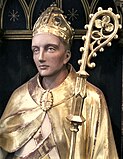
Felix of Burgundy(died 647 or 648) was asaintand the first bishop of thekingdom of the East Angles.He is widely credited as the man who introduced Christianity to the kingdom. Felix came from theFrankishkingdom ofBurgundy,and may have been a priest at one of themonasteriesin Francia founded by the Irish missionaryColumbanus—Felix may have beenBishop of Châlons,before being forced to seek refuge elsewhere. Felix travelled from Burgundy toCanterburybefore being sent by ArchbishopHonorius of Canterburyto the kingdom ofSigeberht of East Angliain about 630. Upon Felix's arrival in East Anglia, Sigeberht gave him aseeatDommoc,possibly inSuffolk,either atWalton,nearFelixstowe,or atDunwich.According toBede,Felix helped Sigeberht to establish a school in his kingdom. Felix died on 8 March 647 or 648, having been bishop for 17 years. Hisrelicswere translated from Dommoc toSoham Abbeyand then to theabbey at Ramsey.Several English churches are dedicated to him. (Full article...)
March 27
Thebattle of New Carthage,part of theSecond Punic War,took place in early 209 BC when aRomanarmy underPublius Scipio(bust pictured)assaultedNew Carthage,held by aCarthaginiangarrison under Mago. Late in 210 BC Scipio took command of Roman forces in Iberia (modern Spain and Portugal) and decided to strike at the regional centre of Carthaginian power: its capital, New Carthage. He marched on the city and immediately attacked it. After defeating a Carthaginian force outside thewalls,he pressed attacks on the eastgateand the walls. Both were repulsed, but later that day Scipio renewed them. Hard-pressed, Mago moved men from the north wall, overlooking a broad, shallowlagoon.Anticipating this, a force of 500 men waded the lagoon to scale the north wall unopposed. They fought their way to the east gate, opened it from inside and let in their comrades. The city fell and became a logistics centre for the Roman war effort. By 206 BC the Carthaginians had been expelled from Iberia. (Full article...)
March 28
Royal Maundyis a religious service in theChurch of Englandheld onMaundy Thursday.At the service, theBritish monarchor a royal official distributes small silver coins known as "Maundy money". The name "Maundy" and the ceremony derive from the instruction ofJesusat theLast Supperthat his followers should love one another. English monarchswashed the feetof beggars in imitation of Jesus, and gave to the poor; the latter custom survives through the Maundy gifts. Recipients were once chosen for their poverty, but are now chosen for service to their churches or communities. At the 2024 service atWorcester Cathedral,the distribution was made byQueen Camillain place of her husband,Charles III,following his diagnosis of cancer. The coins' obverse design features the reigning monarch, while the reverse design features a crowned numeral enclosed by a wreath. In most years there are fewer than 2,000 complete sets of Maundy money; they are highly sought after by collectors. (Full article...)
March 29
Lou Henry Hoover(March 29, 1874 – January 7, 1944) was thefirst lady of the United Statesfrom 1929 to 1933 as the wife ofPresidentHerbert Hoover.She was active in community groups, including theGirl Scouts of the USA,which she led from 1922 to 1925 and from 1935 to 1937. She was the first woman to earn a geology degree fromStanford.In the first twenty years of their marriage, the Hoovers lived in several countries; duringWorld War I,they led efforts to assist warrefugees.Beginning in 1917, they lived inWashington, D.C.,as Herbert became a high government official. In theWhite House,Lou Hoover dedicated her time as first lady to her volunteer work, though she did not publicize it.Her invitationofJessie De Priestto the White House for tea was controversial in the South. After Herbert's defeat for re-election in 1932, Lou Hoover continued her work, helping provide refugee support with her husband duringWorld War II,and died suddenly of a heart attack in 1944. (Full article...)
March 30
John Littlejohn(1756–1836) was an American tradesman andMethodistpreacher. Migrating from Great Britain to theThirteen Colonieswhen he was around 12, he traveled between various apprenticeships in Maryland and Virginia. After encountering Methodistrevivalists,Littlejohn experienced a religious awakening and began preaching as an itinerantcircuit riderduring theRevolutionary War.Harassed by colonial authorities despite his revolutionary sympathies, Littlejohn managed to evade legal persecution and settle as a local preacher and tradesman inLeesburg, Virginia,where he variously served as a county magistrate, tax collector, and sheriff. In 1814, he was called upon in his duty as sheriff to protect theDeclaration of Independenceand various other important documents evacuated during theBritish raid on Washington.He moved to Kentucky several years later, where he entered work as a land agent after being sold falsely advertised land. He died at his home inLogan Countyin 1836. (Full article...)
March 31
TheJarrow March(5–31 October 1936) was a protest against the unemployment and poverty suffered in theTynesidetown ofJarrow,inthe north-east of England,during the 1930s. Around 200 men marched from Jarrow to London to petition the government to restore industry in the town after the closure in 1934 ofPalmer's shipyard.Palmer's had launched more than 1,000 ships since 1852. In the 1920s, mismanagement and changed world trade conditions caused a decline which led to the yard's closure. When plans for its replacement by a steelworks were thwarted, the lack of any large-scale employment in the town led the borough council to organise the march. TheHouse of Commonsreceived the petition but took no action, and the march produced few immediate results. The Jarrovians went home believing that they had failed. In subsequent years the Jarrow March became recognised as a defining event of the 1930s and helped to prepare the way for wide social reform after the Second World War. (Full article...)


